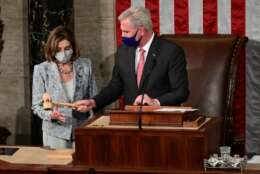Pay
-
Tough times, which are always relevant, happen in government. And sometimes especially at or near the top. Each time rank-and-file employees get a pay raise, folks, often the bosses, at the Grade 15 level get nothing because of an artificial but very real pay ceiling.
January 14, 2021 -
The Merit Systems Protection Board marked four straight years this month without a quorum. While some are hopeful the incoming administration will quickly name new members, the board faces a backlog of at least 3,071 pending cases, some of which could be costly in the long run.
January 13, 2021 -
A 1% federal pay raise with no additional locality adjustments didn't noticeably accelerate salary compression in 2021. But plenty of GS-15s still bumped up against the arbitrary pay ceiling of $172,500 this year.
January 11, 2021 -
The military's largest payroll provider said it will collect taxes that were deferred from employee and servicemember paychecks last year over the course of 24 installments in 2021. Other payroll providers have indicated they'll collect the 2020 deferred taxes from their employees on a slightly different schedule.
January 07, 2021 -
For a brief review of the outgoing Congress and what we might expect from the next, Federal Drive with Tom Temin turned to WTOP Capitol Hill correspondent Mitchell Miller.
January 04, 2021 -
A pandemic, economic downturn and months of skepticism didn't change the plans the president issued last February, when he informed Congress of his intention to give most civilian employees a 1% federal pay raise in 2021.
January 04, 2021 -
In an extraordinary New Year’s Day session, the Republican-controlled Senate easily turned aside the veto, dismissing Trump’s objections to the $740 billion bill and handing him a stinging rebuke just weeks before his term ends.
January 01, 2021 -
President Donald Trump formalized a 1% across-the-board federal pay raise for civilian employees in 2021 via an executive order, which he signed Thursday night with hours to spare before the start of the new year.
January 01, 2021 -
VA deferred collection of these overpayments to give veterans financial relief due to the COVID-19 pandemic.
December 31, 2020 -
DoD will spend $23 billion on housing allowances in 2021, for an average increase of just under 3%. But the increases — or decreases — vary dramatically by locale. Here's the full list of which areas will see the biggest BAH changes.
December 30, 2020 -
The Navy crushed its retention goals for 2020, most likely because of COVID-19.
December 30, 2020 -
A whole swath of professions will lose special pay if Congress can't override the NDAA veto.
December 29, 2020 -
The disappointments associated with federal workers' lower pay raises this year pale in comparison to the challenges that many in the private sector are wrestling with.
December 29, 2020 -
In the President’s Pay Agent’s annual report to Congress released Dec. 17, the three presidentially appointed leaders emphasized the same concerns about the shortcomings of the GS system that many before them have and called on lawmakers to make significant changes.
December 24, 2020 -
Here’s the choice: Money or quality of life. Maybe not much of a choice if getting a smaller salary in return for a less hectic environment would actually be stressful. Whatever, work-at-home feds may soon…
December 24, 2020















